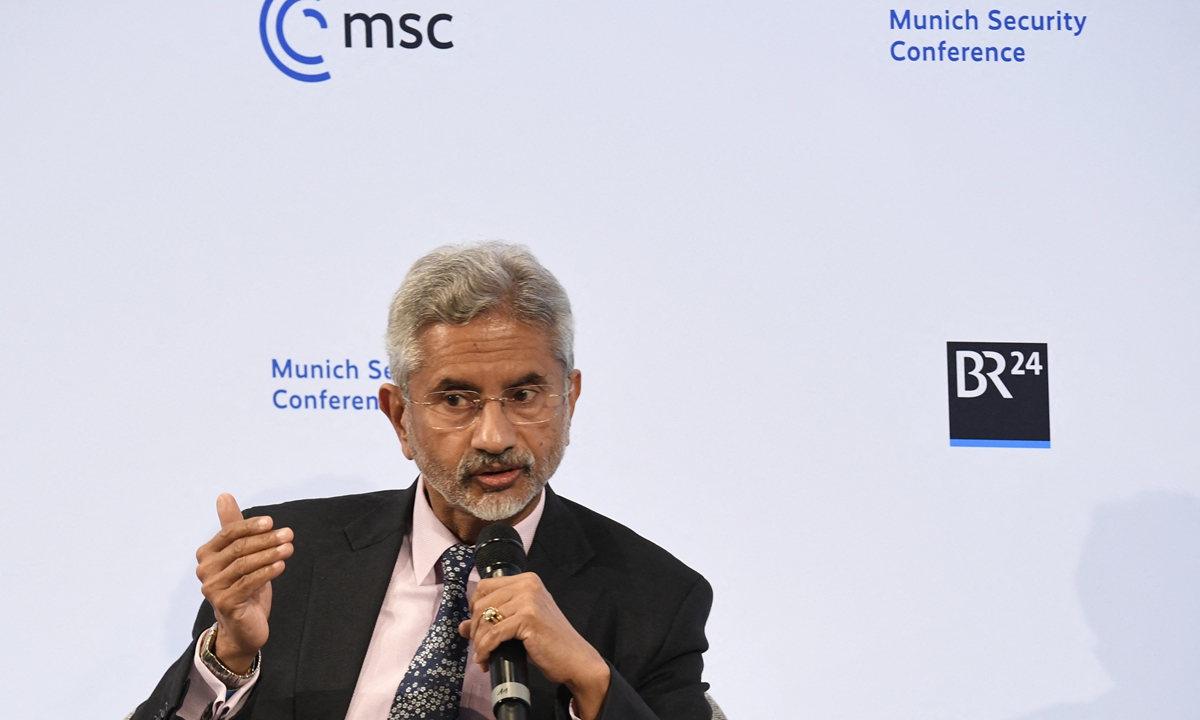
Indian Foreign Minister Subrahmanyam Jaishankar speaks on stage during the 58th Munich Security Conference (MSC) in Munich, southern Germany on Saturday. Photo: AFP
Indian External Affairs Minister Subrahmanyam Jaishankar recently has twice mentioned the China-India border dispute on a multilateral occasion. New Delhi may try to exploit the force of the international community to embolden itself and further play with fire on the border issue. Such a dangerous tendency is what China needs to be wary of.
Meanwhile, India has also been warning against what it calls a "debt trap" brought by aid from China, attempting to block cooperation between China and other regional countries.
So far, India has not shown that it is willing to repair its relations with China, said experts. It hasn't shown any willingness to make compromise or leave room for negotiation. Instead, New Delhi keeps using provocative words to disrupt the already fragile mutual trust between the two countries and intensify the conflict.
India's relations with China are going through a "very difficult phase" because Beijing violated border agreements, said Jaishankar at a panel discussion at the Munich Security Conference 2022 on Saturday.
On February 12, he made similar remarks during a joint news conference in Melbourne after a bilateral meeting with his Australian counterpart, held on the sidelines of the 4th Quad foreign ministers' meeting.
Lan Jianxue, head of the Department for Asia-Pacific Studies at the China Institute of International Studies, told the Global Times that New Delhi may intend to internationalize the China-India border dispute, a bilateral matter. In his opinion, India now seems to find it difficult to achieve its goals under a bilateral framework, therefore, it turns to other countries. By leveraging their power, India hopes to pressure China to make a concession over the border issue.
Besides, as the tension over Ukraine crisis grows, India fears that all attention from the US and the West, in general, is on Russia and Europe instead of the Indo-Pacific region. By mentioning the border dispute with Beijing, New Delhi is grabbing Washington's attention and screaming "Don't ignore my appeals! Please continue your suppression and containment of China!"
However, India is being unrealistic. First of all, for any two countries, bilateral issues should be discussed under a bilateral framework where both sides can directly express their core concerns and demands. This is the most convenient and effective way to resolve bilateral disputes. The Chinese Embassy in India noted in a statement in October 2020 that "the boundary question is a bilateral matter between China and India… China and India have the wisdom and ability to handle their differences properly. There's no space for a third party to intervene."
On the other hand, few third party countries have the intention to intervene in the dispute between China and India. They know perfectly well that an intervention, be it direct or indirect, will definitely affect their relations with China. According to Lan, these forces also clearly understand that India is just using them and the current international situation to gain more leverage in the border dispute and to use their power to intimidate China. India's intention is failing and will never succeed.
Jaishankar also implied on Saturday that regional countries should be warned against a potential "debt trap" behind Chinese aid. Coincidentally, some Indian media outlets reported Sunday that Sri Lanka is moving away from China while getting close to India over the failure by Colombo to pay back Chinese loans worth $4.5 billion, amid fears of a "debt trap."
Jaishankar's statement may be seen as disrespectful by some countries in the region, said Long Xingchun, a senior research fellow at the Academy of Regional and Global Governance of the Beijing Foreign Studies University. He pointed out that the loans the regional countries received were not imposed by China, but were accepted by each country based on their conditions. These nations don't need India to make decisions for them, he noted.
According to Long, India is actually trying to prevent these regional countries from obtaining resources from China and cooperating. In New Delhi's eyes, those countries can only cooperate with India. The point is that India itself has no capacity to drive the development of these nations, but it cannot prevent China from providing development impetus.
Jaishankar asserted that "the state of the border will determine the state of the relationship." But if India really wants to settle its border issue with China, it needs to understand it is the one that has caused the current impasse between the two countries. A new round of tension was created when India tried to unilaterally change the status quo on the China-India border by enhancing infrastructure construction in the disputed area. The fundamental solution to this dispute is India changing its rigid position on the border issue.
New Delhi has already had some unrealistic expectations from external forces, such a fantasy can possibly encourage India to make more provocative moves around the border. Lan thinks history has proven that India was also provocative on the border issue when it thought the international environment was favorable to it. "India should learn from history. It has to pragmatically recognize the current international environment, the situation of the relationship between China and India over the border, and its own strength. Only in this way can it avoid strategic miscalculation," he noted.
The author is a reporter with the Global Times. opinion@globaltimes.com.cn




